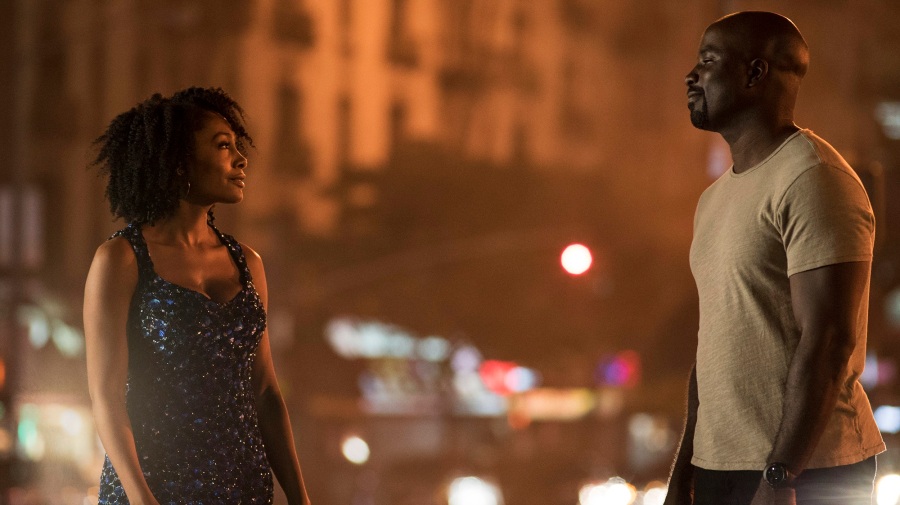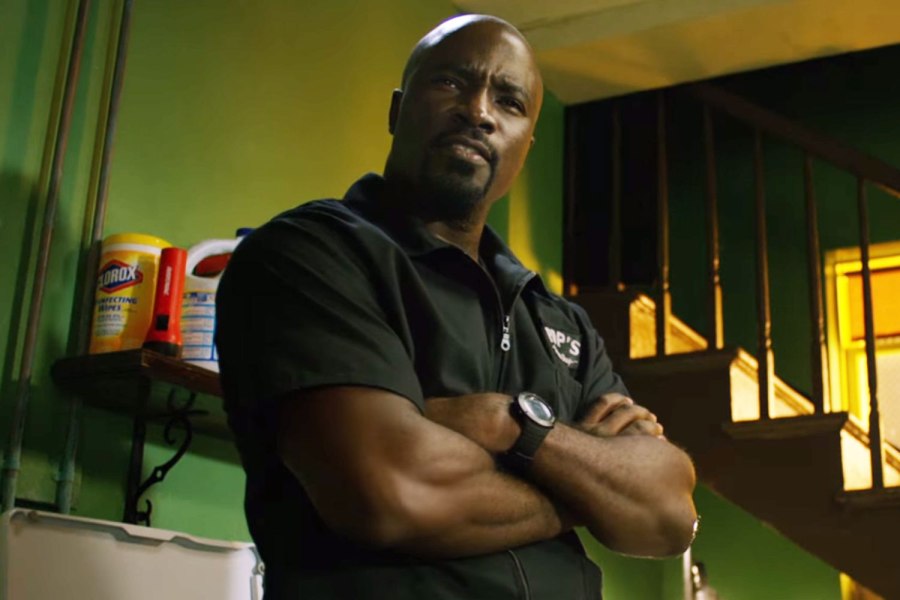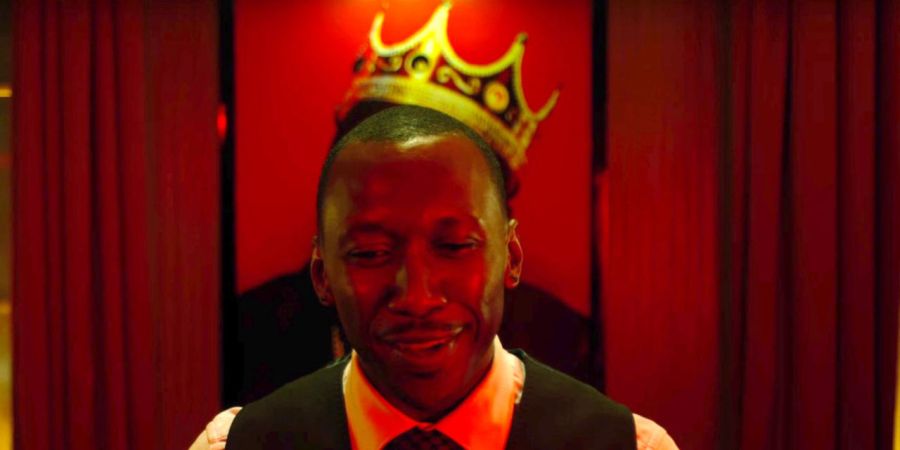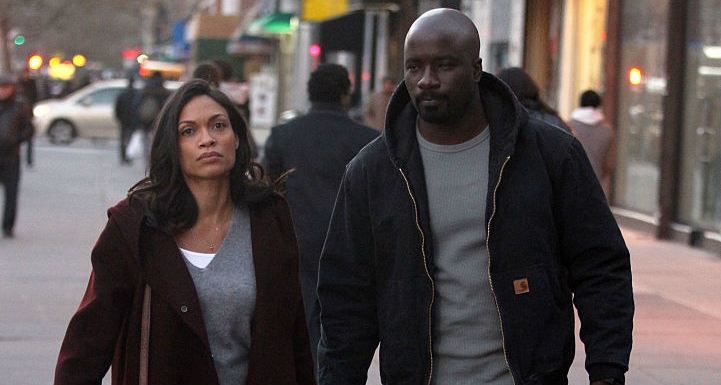The Hero Of Harlem
*SOME SPOILERS BELOW*
It takes big, broad shoulders to put not only an entire city, but the hopes and dreams of millions on your back, but that was the task given to Luke Cage. Not only the character, in the first season of his show, but everyone behind the scenes, as the famously Black character was was being crafted by a largely Black creative team. Bringing Power Man to life in 2016 wasn’t a sure shot, but after a scene stealing performance during Jessica Jones, we all waited with baited breath for the Hero for Hire to go out on his own, and i’m happy to say he didn’t disappoint. Was it perfect, no. It actually suffered from many of the same issues that the rest of the Marvel’s Netflix shows have, but the where the writing and pace falter, the unflinching Blackness of it all keeps you engaged.
Your first introduction into Luke Cage is the boom-bap of the title sequence, right away letting you know this will be something different than other Netflix offerings, outside of the criminally underseen The Get Down. Brownstones and street sign strewn across the back and broad shoulders of our silhouetted hero. This is Black superhero music right here. But thrown in with the nondescript buildings and alleyways are subtle winks that this story has to be “accessible” to those not with the culture. On surface, you’ll being peeking into a dramatized version of inner-city living upended by the appearance of a homegrown hero, but you don’t live here, you’re just passing through. That image is of the commuter rail sign. It reads “Harlem-125th Street“, high above the city streets, it provides a glimpse of Harlem before commuters hurry off to their connecting train. Whether to work, or to catch the Yankee Stadium Shuttle. Either way, if you’re on that train, you’re not from here. A subtle nod that while some people may be taking their first intimate look at Harlem, don’t get it confused with being from Harlem.
Luke Cage was already a famed hero from the 70’s, but updated to 2016, the presence of a bulletproof Black man, wearing a hoodie carries immense weight, and allows for Mike Colter to be the paragon of a young, mostly ignored generation.
Luke Cage picks up about five months after the events of Jessica Jones. Luke is living a low profile life as the janitor/handyman in a local Harlem barbershop, and a dishwasher in the nightclub, Harlem’s Paradise. It’s that connection to both locations that throws Luke back into the superhero racket he’d desperately been trying to avoid. Oddly reminiscent of Man of Steel, Luke doesn’t want the world to know he exists. While The Avengers have the “luxury” of living freely and using their abilities, Luke runs from them. Using his strength occasionally to help out on an oddjob. He’s an everyman that’s nothing like the people around him. That’s until he tries to intervene in the lives of some of the young men that frequent Pops’ Barber Shop who have run afoul of burgeoning kingpin, Cottonmouth, magnificently played by Mahershala Ali.
Wrapped in with Cottonmouth is his cousin and shady councilwoman, Mariah Dillard, played by Alfre Woodard (in a different role than the one played in Civil War). The two find themselves in a fight for control of Harlem from a man that actually wants nothing to do with their war. It’s their plays for power that ultimately suck in Luke, while simultaneously bringing about their own undoing. In a mirror to Cage’s yearning for an unassuming life, both of the villains want something different than they show at face. Cottonmouth wasn’t a gangster, he was forced into ill-fitting clothes and made to live the part. His speech about everyone wanting to wear the crown, even though it doesn’t fit basically foretold his story. Luke Cage’s very existence called Cottonmouth power into question, and everything began to fall. It was a nice character development, but the structure and writing let that character down for half the season. Both Cottonmouth and Mariah spin in circles while concocting half plans that amount to nothing, until Diamondback (Erik LaRay Harvey) steps in to exact his personal vengeance on Luke.
There is a clear split in the Luke Cage story that would have greatly benefitted from maybe one or two fewer episodes. Some judicious writing edits could have also saved the show from becoming overly preachy in spite of itself. I could get on board with Luke spouting Black History facts in the beginning, no matter how groan inducing it was personally, because it fit for him. This version of Luke is the son of a preacher man, born and raised in Savannah, GA. His sensibilities lined up with that form of pontificating. It’s on the back half of the season where everyone got in on the act that it became bothersome. For a show that embraced some semblance of subtilty, at least when it came to visions of Black culture, it was a let down to have so many things spelled out. Again, for those just passing through. Problem is, that could also apply to Luke himself. He’s not born and bred on the harsh New York streets. He’s a former cop, and ex-con from a world that’s totally different than the place he currently finds himself. It’s why, after it’s all said and done, his initial running could be confused with him trying to differ himself from the people of Harlem, while they eventually rally around him.

It’s that inconsistency that hung around in my head after binging the show. Making sure not to get distracted by the world around me. So far, the only Marvel show on Netflix to pass my “could this work weekly” test has been Jessica Jones, and just barely in her case. That show was built around the neo-noir, private eye aesthetic that then fell more and more to the wayside as David Tennant’s Purple Man played a bigger role. Luke Cage has no procedural elements, just a loose fabric of stories that create the singular arch. The first four episodes could have been two, while flashbacks could have been moved around to flesh out some characters. Like Black Mariah, who, for all of her concerns over spin, and saving face, is never really shown to interact with the city or its people until her back is already against the wall. In Daredevil, we saw more of Wilson Fisk’s public face before he was truly exposed as the Kingpin. We only know Mariah as the seedy version, who is slowly becoming an actual criminal.
That connection is key, because Luke Cage does a remarkable job making Harlem feel like a living and breathing character. The music choices play a HUGE part in that regard. From the live performances giving off a New York Undercover vibe. To the score underlying every scene. I swelled with pride when Luke busted into the New Harlem Renaissance building while Bring The Ruckus by Wu-Tang played. Luke, Mariah and Cottonmouth all shun Harlem in some way, only one of which coming around to be the hero. The only soul of the city for a large chunk comes in the form of Misty Knight (Simone Missick), who actually has birth ties to the section. She is concerned for the people who can actually catch a bullet as the gangs and crime lords find a way to eventually take Luke out.
In those moments are where some of the better story elements are lost. Luke Cage lightly touches on police overreach, mob mentality, and idolatry. Having Luke interact on a more day by day basis would have helped these areas immensely. In the end, they were open threads on a lavish tapestry.
If it sounds like i’m being hard on Luke Cage , it’s because i’m slightly disappointed. It could have been so much more than it was. Much like Superman, Luke’s invulnerability opens the door to imaginative ways to actually put the hero in danger. Luke gets shot at, a lot. It’s only rarely that this is called into question by the bad guys. Some moments of self awareness and head dives into full on Blaxploitation make this show feel better than it is. Luke Cage is cool as shit. The city, its people, the music and characters all work to create something greater than the sum would have you believe. I wanted more of Cottonmouth, of the clubs, the little nods of things to come (Misty better keep an eye on that arm), it all made my little nerd heart smile. It was only after looking back on it all that I realized that the character of Luke Cage took a bit of a step back from where we’d left him in Jessica Jones. I still want more of that character, and the world he inhabits, I just want the driving force behind him to deliver more.




[…] what you will about the Luke Cage series as a whole, which I did, but there’s one thing we can all agree on, and that’s the soundtrack was bananas. […]
LikeLike